Higher education institutions’ contributions to serving society are fundamental to a country’s economic and social development. However, in 2021, graduates of Spanish universities faced the second–highest unemployment rate in the European Union, according to data from the CYD Report 2021/2022 of the CYD Knowledge and Development Foundation. By September 2023, the unemployment rate in Spain had fallen; however, it was still high (11.9%), and by the beginning of 2024, the forecast was 11.5%, according to figures from the Economic Study of Spain by OCDE. For this reason, a recently signed agreement between the Spanish Confederation of Business Organizations (CEOE) and the CYD Foundation promotes the development of the Spanish university system to create an academic-business culture conducive to flexible, competent, and quality training that responds to the demands of today’s society and contributes to the economic and social progress of Spain.
Committed to this purpose, the University San Pablo CEU in Madrid conducted a study analyzing how higher education institutions can include soft skills in their curriculum to help graduates obtain the skills to access the labor market successfully. Soft skills are interpersonal skills that complement the technical skills of each degree and are necessary to perform a job. According to the leading employment recruitment companies, a job applicant’s soft skills account for 80% of the weight of the decision in a selection process.
University San Pablo CEU implemented a focused training program where students develop soft skills through agile methodologies for 1) self-knowledge and communication, 2) teamwork and leadership for the future, 3) innovation skills, and 4) basic skills for the first job. This innovative academic program incorporates different transversal modules in all the undergraduate and postgraduate offerings to prepare students to develop the soft skills they need to enter the workplace.
Development of the training program “Your Future Degree.”
This academic program uses a blended learning methodology based on social-challenge group learning. Students can combine face-to-face and inspirational online sessions through webinars taught by experts in each subject. Likewise, teacher-mentors monitor and support the students, accompanying them in achieving the designated social challenges.
Students must see and perceive this degree as a curricular improvement that will open opportunities for them in the future rather than as an added workload. Students go through four stages or phases related to the four program modules to do this.
- Know yourself. At this stage, particular attention focuses on individual attitudes and emotions. Students learn to know themselves to achieve better leadership despite life’s challenges; knowing themselves facilitates this process. For this reason, the sessions emphasize self-knowledge, emotional intelligence, and communication skills.
- Manage change with others. Understand change as a problem. The students begin to work together so that the important thing is no longer the individual student but the group with whom they collaborate, and the first difficulties arise.
- Become an agent of change. Understand change as a temporary process. Change should be seen as a gradual adaptation to new scenarios that arise. For this reason, this module emphasizes understanding the need for innovation, entrepreneurship, and new technologies, always favoring sustainable development.
- Adapt professionally to changes. Understand change as a professional strategy. Students must adapt their curricula to the new job demands, turning their learning into a job placement strategy.
The teaching methodology is the same for all the modules, the only difference being the session content and the proposed challenges. Through Google Forms, students can select any career offered by the university and the challenge upon which they will work. Subsequently, groups (classes) are formed comprised of students from different specialties and scientific fields, which allows students to learn to manage diversity.
The role of the mentor is fundamental, as they must periodically monitor the work done by the students to provide feedback for improvement; the more frequent the feedback between the mentor and the group of students, the greater the help the mentors can offer.
Program Methodology
In the academic year from September 2022 to June 2023, 497 students were enrolled in 28 groups (classes) to solve the proposed challenges.
- First-year students analyzed self-knowledge and communication skills through inspirational Masterclass webinar sessions with professionals who are experts in the field. The students made a Communication Journey Map or a visual representation of improving a customer experience when using a specific service to demonstrate what they had learned.
- In the second module, students learned how to be leaders and designers of the future, which is necessary for the volatile environment in which we live. They made a sustainable leadership style book using all kinds of formats, including TikTok and Instagram, which also meant that they put their creativity into practice, not just their reflective thinking.
- The third-year students faced challenges related to innovation and entrepreneurship, such as innovative and sustainable cities, local-global trade, new ways of working, and health and well-being. They were evaluated by external professionals from companies in different sectors, such as Adecco, Manpower, Iberia, NTT Data, Huawei, Xiaomi, and Accenture.
- To solve the challenge, the students had to research the topic on different electronic media and websites or by interviewing experts and related people. They conducted simulations of possible solutions they developed, applying satisfaction questionnaires to potential users or contacting other students who had dealt with similar topics to look for synergies. As a group, the students uploaded their final proposals to Google Drive in video, poster, website, or wireframe format. They shared access to these materials with professionals who formed a jury and chose the groups that gave the best proposals.
- The students resolved challenges or sub-challenges following the Google Design Sprint methodology, a problem-solving model developed by Google Ventures in 2010, which gained popularity in 2016 with the publication of the book Sprint by Jake Knapp. This design process allows the validation of complex ideas and problems in just five days by creating rapid prototypes and testing with real users.
- Finally, the fourth-module students acquired professional skills for their imminent incorporation into the labor market. They addressed various current topics such as digital badges, how to use them and add them to the LinkedIn profile, how to make a video resume, how to write a cover letter and personnel selection dynamics. They also attended a practical agility workshop, where they learned to work as a team in different situations that simulate a company’s reality, ending with a podcast.
Results
We conducted a Likert survey with the students to analyze the results of this methodology for learning soft skills, where 1 was not at all satisfied, and 5 indicated very satisfied.
Table 1 shows the results from each module regarding the students’ general degree of satisfaction with the “Your Future Degree” program. In Figures 1 and 2, the very satisfied students in the first module exceeded 55%, reaching almost 90% in the fourth module. This is logical since the final-year students value the overall nature of the degree and its importance for future work. The percentage of dissatisfied students was less than 1% in every course; thus, it was a non-important piece of information.
| Module | 1(not satisfied) | 2 | 3 | 4 | 5 (very satisfied) | Total students |
| Know yourself. | 4 | 5 | 36 | 144 | 232 | 421 |
| Manage change with others. | 0 | 2 | 5 | 59 | 169 | 235 |
| Become a change agent. | 2 | 4 | 22 | 64 | 151 | 243 |
| Adapt professionally to changes. | 0 | 1 | 3 | 14 | 143 | 161 |
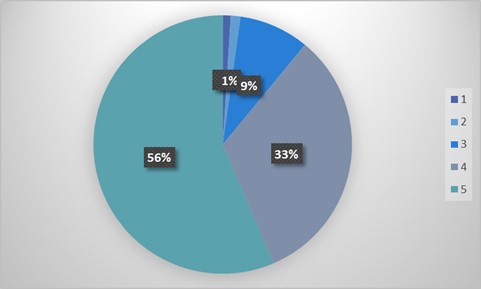
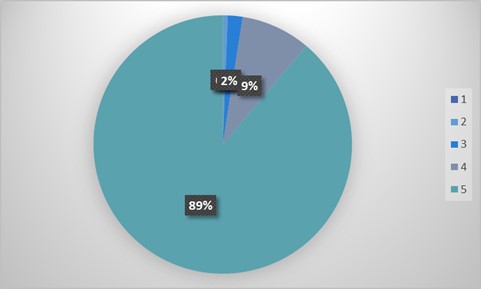
This result has varied from the second year in which this degree began being taught (the 20-21 academic year), where satisfaction was 53%, compared to the current academic year, where the general average satisfaction is 81% (Figure 3), due mainly to the advice received from students, professionals, and mentors.
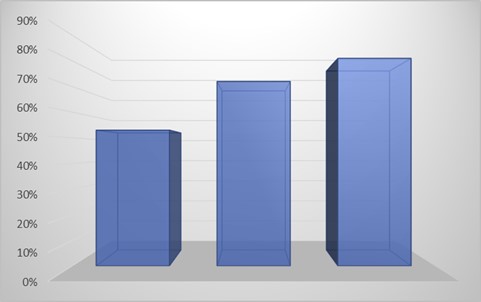
Notably, 64% of students rated all courses and the usefulness of the modules as very satisfactory. It is important to know students’ feedback about the degree offered, although, as in the previous case, the assessment was much higher among students in the fourth year than in the first year. (See Figures 4 and 5).
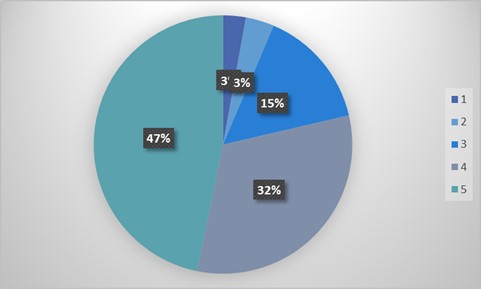
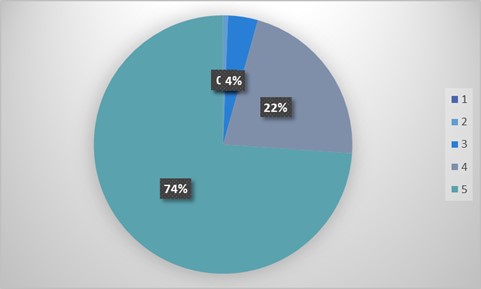
Another fact to highlight is the experience of working with social challenges since most respondents gave maximum value to this form of learning, which in almost all courses was around 90%. Figure 6 graphically shows the results of all the survey questions grouped into the four years of the undergraduate studies analyzed.
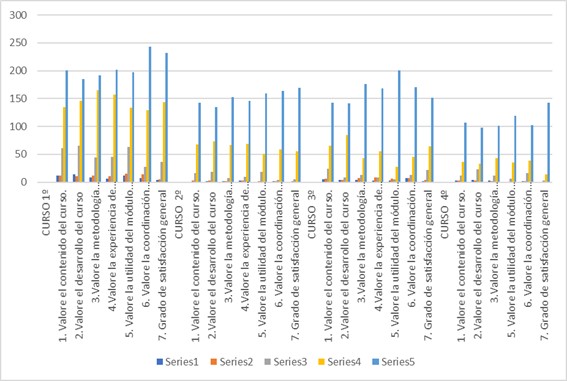
Reflection
The overall university results affirm that students feel the modules are very satisfactory in bringing the university world closer to the labor market and improving the employability of graduates. The students gave a high value to the experience of working with social challenges for their learning, which we will continue to improve with the feedback of all participants.
We live in an environment subject to continuous changes that impact learning content and how we learn. Universities must significantly reduce the gap between their graduates and the labor market in skills training. The universities must explore new ways of introducing this training into their curricula, for example, transversal training in all their degrees, as the San Pablo CEU University has done.
About the authors
Dr. Sonia Martín Gómez (margom@ceu.es) has been a San Pablo CEU University professor since 1994, responsible for the Future Degree and the Transformative Skills Postgraduate Program. She received the award for the application of new technologies in teaching and the award for innovation in operational management from the USP-CEU company.
Dr. Ángel Bartolomé (abartolome@ceu.es) is a San Pablo CEU University professor with a Ph.D. in communication and Vice-Rector for CEU Students. He has a master’s degree in design management EOI and Certification as a Soft Skills Teacher from the University of North Carolina (USA). Dr. Bartolomé has been a Researcher in 12 competitive projects.
References
Arroyo, F. (2019). Revolución tecnológica: la era de las competencias blandas. Cantabria: Universidad de Cantabria. Accessed from https://repositorio.unican.es/xmlui/handle/10902/17506
Casanova, P., & De La Torre, M. J. (2007). El comportamiento docente. En E. Fernández, F. Justicia, & M. C. Pichardo (Coords.), Enciclopedia de Psicología Evolutiva y de la Educación, Volumen I, Málaga: Aljibe, 557-581.
Galán Vallejo, M. (2003). Técnicas para obtener la opinión de los empleadores. Seminario Métodos de análisis de la inserción laboral de los universitarios. León, 9, 10 y 11 de junio.
Hargreaves, A., Fink, D. (2003). Sustaining Leadership, Phi Delta Kappan, 84
(9), 693-700. doi:10.1177/003172170308400910
Fundación Conocimiento Y Desarrollo – CYD (2021). Informe CYD 2021/2022. Barcelona: Fundación CYD. https://www.fundacioncyd.org/wp-content/uploads/2022/12/ICYD2021_A_CAP0.pdf
Knapp, J., Zeratsky, J. Y Kowitz, B. (2016). Sprint: El método para resolver problemas y testar nuevas ideas en solo 5 días. Barcelona: Conecta.
Rué, J. (2009). El aprendizaje autónomo en educación superior. Madrid: Narcea.
Whiting, K. (2021). Estas son las 10 principales habilidades laborales del futuro y el tiempo que lleva aprenderlas. Word Economic Forum. https://es.weforum.org/agenda/2020/10/estas-son-las-10-principales-habilidades-laborales-del-futuro-y-el-tiempo-que-lleva-aprenderlas/
Editing
Edited by Rubí Román (rubi.roman@tec.mx) – Editor of the Edu bits articles and producer of The Observatory webinars- “Learning that inspires” – Observatory of the Institute for the Future of Education at Tec de Monterrey.
Translation
Daniel Wetta
This article from Observatory of the Institute for the Future of Education may be shared under the terms of the license CC BY-NC-SA 4.0 
)
)

)